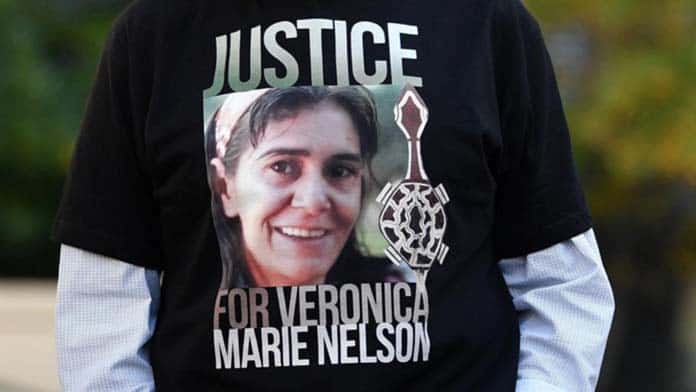On 30 January, coroner Simon McGregor handed down his report into the death of Gunditjmara, Dja Dja Wurrung, Wiradjuri and Yorta Yorta woman Veronica Nelson in Melbourne’s Dame Phyllis Frost prison.
The findings were an indictment of the racist, violent prison system in Victoria and the complicity of successive governments in perpetuating policies that kill Aboriginal people in custody.
Four days before her death in January 2020, police arrested Veronica over shoplifting allegations. That evening, Veronica awaited her bail application hearing in the Melbourne Custody Centre. The court didn’t reach her matter.
The next morning, police opposed Veronica’s unrepresented application for bail and the magistrate refused her.
She was then sent to prison. Over 36 hours, Veronica used the intercom 49 times to request assistance or complain of symptoms, pleading: “I feel like I’m going to die.”
After 4am on the morning of 2 January, Veronica stopped responding in the middle of a call to prison staff. No one checked on Veronica and she was found dead at 7.30am.
McGregor said: “The sounds of Veronica’s last pleading calls for help echoed around the courtroom when played during the inquest, prompting me to ponder how the people who heard them and had the power to help her did not rush to her aid, send her to hospital, or simply open the door of the cell to check on her.”
Fatal neglect
The coroner found that Veronica “died of complications of withdrawal from chronic opiate use and Wilkie Syndrome in the setting of malnutrition”. Veronica would have been alive today if the prison staff had responded to her pleas, he said.
Prison guards even told another inmate, Kylie Bastin, that she was “not allowed” to give cordial to Veronica to help with her withdrawal.
It was the neglect from racist, drug-stigmatising prison staff that killed Veronica Nelson. But it was the refusal of Veronica’s bail that delivered her into their hands.
Despite its progressive image, Dan Andrews’ Labor government has overseen a large expansion in budgets for police, prisons and “tough on crime” policies.
The 2018 Bail Act created a presumption against bail for all repeat offenders, regardless of the severity of the crime.
In 2021, 89 per cent of Aboriginal and Torres Strait Islander women entering prison were unsentenced.
Under pressure from the inquest findings, Andrews has now committed to reforming his own Bail Act. But this is just one policy shift in a broader agenda that prioritises punishment over social support.
Andrews’ policies run counter to the recommendations of the Royal Commission into Aboriginal Deaths in Custody, which delivered a landmark report in 1991 calling for systemic reform to stop Black deaths.
The recommendations include “close monitoring of bail legislation to ensure [it doesn’t restrict] the grant of bail to Aboriginal people”; use of imprisonment “only as a last resort”; and “the provision of health care to people in custody to a standard equivalent to that available to the general public”.
In his inquest findings, coroner McGregor argued: “Had the RCADIC recommendations been successfully implemented by the government and its agencies, Veronica’s passing would more likely than not have been prevented.”
Voice no solution
The Albanese government is also not addressing the mass incarceration of Indigenous people and the deaths in custody crisis. Instead, it is talking up the Voice to Parliament.
Albanese has reassured right-wingers that the Voice will have no real power. Yet Labor also claims it will give Aboriginal people direct input into policy.
The government already knows how to stop deaths in custody. It just refuses to challenge the power of police.
Police and prisons play a crucial role in defending capitalism—a deeply unequal, unstable system which continuously expands a few people’s wealth at everyone else’s expense.
“Tough on crime” policies also allow governments and media to blame targeted communities for their own social misery.
Andrews has allocated $3.9 billion extra to the police and spends $1 million a day to keep unsentenced prisoners in jail.
Meanwhile, as Victorian Aboriginal Legal Service chief Nerita Waight reports, there are 35 Aboriginal people arrested each day, most accused of economic crimes.
At the 2023 Melbourne Invasion Day rally, Senator Lidia Thorpe said she might support a Voice if the government showed it was serious about acting on longstanding Indigenous demands.
“When [the ALP] implement the RCADIC, the Bringing Them Home report, the Close The Gap report … otherwise what? They’re going to bring in an advisory body, that has parliamentary supremacy over it at all times, to give [the parliament] advice on what? implementing recommendations?”
The real voice is on the streets—we need to build a protest movement, backed by workers’ power, that the parliament can’t ignore.
By Jayden Rivers






